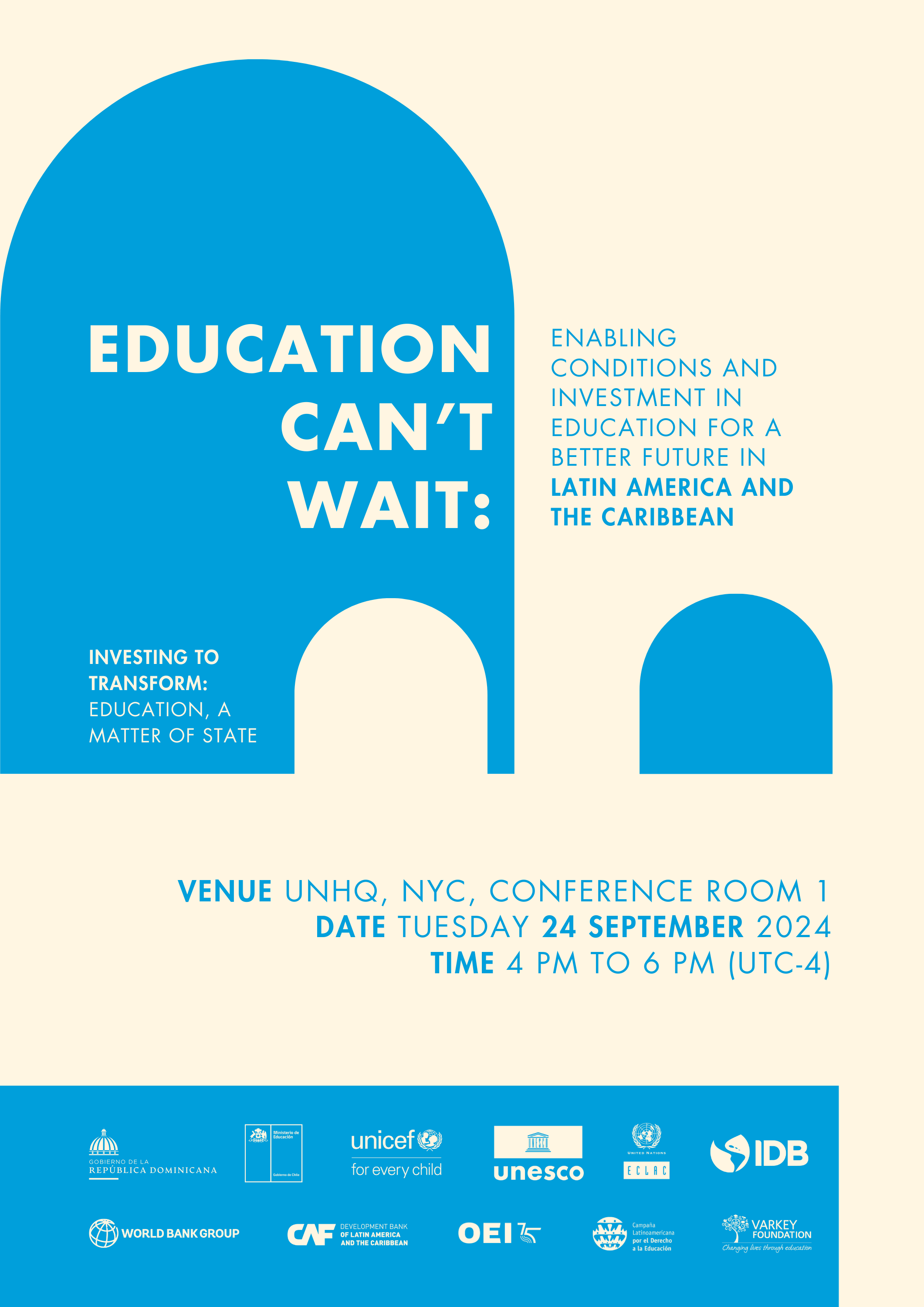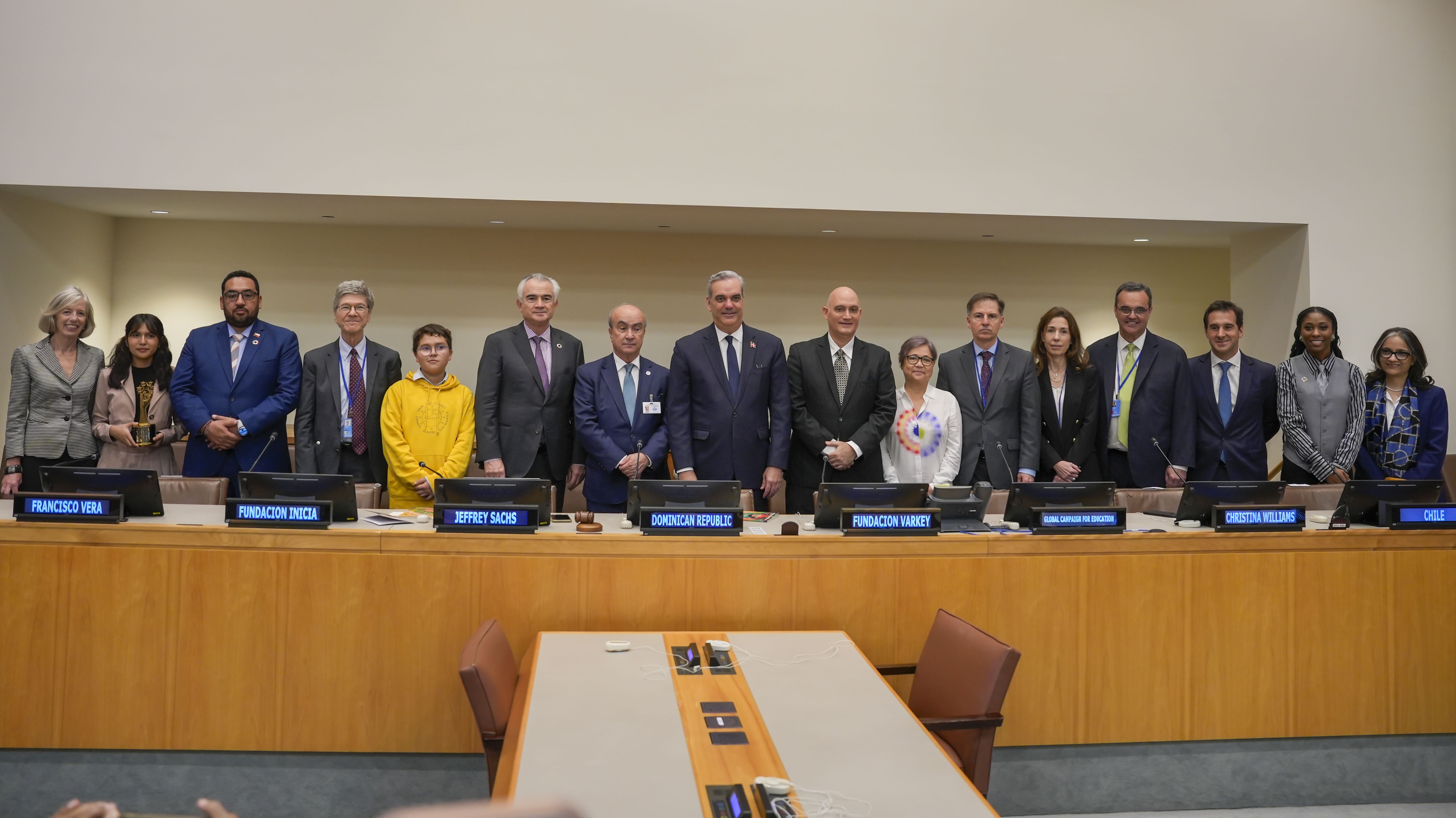Education can’t wait: Enabling conditions and investment for a better future in Latin America and the Caribbean
Work area(s)
Teaser
Be part of this event that brings together high authorities of the region to consolidate and mobilize a common position to ensure the enabling conditions and financing strategies that will allow for a sustainable transformation of public education, the achievement of the educational goals of the 2030 Agenda, and, with this, the advancement towards guaranteeing the human right to education for all.
Event information

Date
24 Sep 2024, 13:00 - 15:00Event type
Participation
Background and context
The human right to education is the foundation of the principles of development, peace, and security on which the 2030 Agenda is based. It enables and accelerates progress on all the Sustainable Development Goals (SDG), promoting the exercise of human rights, improving productivity and quality employment, combating poverty, building democratic and equitable societies, gender equality, cultural diversity, and well-being. Education also raises awareness about climate change, promotes sustainable practices, and facilitates the implementation of mitigation and adaptation strategies to address this phenomenon.[1]
On January 25 and 26, the Extraordinary Meeting of Ministers of Education of Latin America and the Caribbean provided an opportunity for a broad debate on effective strategies to achieve the goals of SDG 4 and the commitments outlined in the Transforming Education Summit (TES). One of the key agreements reflected in the Declaration of Santiago 2024 was the need to provide a systemic response to the educational challenges of the 21st century, promoting the comprehensive development of learning and competencies, both cognitive, socioemotional, digital, and life skills, and guaranteeing the financial sustainability of education as an enabling condition.
Education financing has been included in global agreements in recent years. The Education 2030 Framework for Action recognized that achieving SDG 4 would require increased investment in education, especially in areas where gaps and inequities are identified. Similarly, the TES urged countries and partners to mobilize greater resources, both domestic and international, to increase investment in education, improve equity and efficiency in spending through sustainable financial management, periodic monitoring, and evaluations, as well as the availability of more data and accountability.
Recognizing that education is a catalytic investment for the sustainable future of society and the planet, countries face the challenge of intensifying their efforts to expand fiscal space and allocate more resources to public education through progressive tax reforms, innovative financing, debt relief, and public-private cooperation. Donors should also increase funding for long-term investments in education and support countries in enhancing their capacity to mobilize national resources.
Education is a smart investment to break free from the trap of the region's low growth and high inequality. Advancing towards inclusive, equitable, and quality education is a political decision tied to the type of development that is desired. However, Latin America and the Caribbean countries face significant challenges in consolidating financing strategies that can enable this transformation. For instance, in 2022, while the region met at least one of the internationally agreed minimums—public spending on education of at least 4% of GDP (a minimum reached by the Caribbean) and at least 15% of total public expenditure (a minimum reached by Latin America)—all countries in the region, compared to more developed economies, showed relatively low spending per student, particularly at the pre-primary level[2].
Financial sustainability in education is essential for implementing stable medium- and long-term policies focusing on distribution mechanisms to compensate for students' initial inequalities and guarantee the right to education. Additionally, inefficiencies must be identified and corrected, with priority given to allocating resources in areas where evidence shows the highest returns, such as improving teacher quality and developing public information and management systems that include monitoring the use of resources.
Latin America and the Caribbean have committed to ensuring that educational financing does not regress and is able to meet and exceed internationally established financing targets. At the same time, there has been a significant consensus in viewing the reactivation, recovery, and transformation of education as accelerators for achieving SDG 4, with an emphasis on promoting fundamental learning and competencies, as well as the building of a culture of peace and non-violence, global citizenship education and education for sustainable development.
With this background, in the context of the opening of the 79th session of the UN General Assembly and following the Summit of the Future, the Government of the Dominican Republic with the support of the Ministry of Education of Chile, UNICEF, UNESCO, ECLAC, the Inter-American Development Bank (IDB), the World Bank, the Development Bank of Latin America and the Caribbean (CAF), the Organization of Ibero-American States (OEI), the Latin American Campaign for the Right to Education (CLADE) and Varkey Foundation, convene a special high-level event on enabling conditions and sustainable financing strategies to achieve SDG 4.
Objective of the event
Call on the high authorities of the region to consolidate and mobilize a common position to ensure the enabling conditions and financing strategies that will allow for a sustainable transformation of public education, the achievement of the educational goals of the 2030 Agenda, and, with this, the advancement towards guaranteeing the human right to education for all.
Specific Objectives
- Reflect on the need to advance in ensuring enabling conditions and sustainable financing strategies for educational reactivation, recovery, and transformation.
- Reflect on the importance of regional cooperation and the role of multilateralism in promoting a concrete commitment by all actors to sustainable financing of education, establishing regional spaces for dialogue and learning, between education and finance authorities.
- Present successful and innovative initiatives that have contributed to improving education in diverse contexts, based on sustainable, equitable, inclusive, transparent, and efficient financing.
- Position the Latin America and Caribbean region in the global context and the implementation of the TES agreements and the Pact for the Future as a reference for the commitment and mobilizing capacity of its leaders in ensuring the human right to education.
Expected result
High-level commitment to promote and mobilize actions with governments, international cooperation, civil society, and the private sector to ensure the enabling conditions and sustainable financing strategies necessary for transforming education and achieving SDG 4 targets.
[1] Input prepared by the SDG 4 High-level Steering Committee for the Pact for the Future
[2] https://www.cepal.org/es/publicaciones/68806-desafio-la-sostenibilidad-financiera-la-educacion-america-latina-caribe
Programme of work
Opening and welcoming
Investing to transform: education, a matter of State
Where are we, and where do we want to go?
How much are we willing to invest in this?
The vision and commitment of a head of State. His call to action to other countries in the region.
His Excellency Mr. Luis Rodolfo Abinader Corona, President of the Dominican Republic
Inaugural Conference
The Crucial Role of Education Finance in Economic Development: A proposal for practical action.
What opportunities does investing in education create?
What are the consequences of not doing so?
What should we do to enable a sustainable transformation of education?
The opportunity cost of investing in education, the urgency of action, and a road map for the region's future.
Jeffrey Sachs, Columbia University
Political Dialogue
From Words to Action: Strategies for Increasing Revenue, Investment and Efficiency in Education
What is the financing needed for education in our countries?
Where can these resources come from?
How can we be more efficient in spending and increasing resources that impact students?
Ministers of Finance and Education share their views on these challenges and the best way to ensure these two portfolios work towards the same objective.
H.E. Pavel Isa Contreras, Minister of Economy, Planning and Development of the Dominican Republic
H.E. Fernando Haddad, Minister of Finance of Brazil (TBC)
H.E. Nicolás Cataldo, Minister of Education, Chile
The demand for the right to education
United for education: financing learning, a commitment from all
The perspective of various stakeholders on transforming education in the region and achieving the SDG 4 educational goals.
Amelia Vicini, Chair of the Board of Directors, Fundación Inicia
Agustín Porres, Varkey Foundation (TBC)
Nelsy Lizarazo, Vice-President Global Campaign for Education and CCNGO representatives on the SDG 4 High-level Steering Committee
Francisco Vera, youth activist
Christina Williams, youth activist
Call to action
Call to action: For a political and social pact to finance and transform education
Contributions from multilateralism to transforming education in the region and to achieve the SDG 4 educational goals.
UNESCO: Stefania Giannini, Assistant Director-General for Education
UNICEF: Mandeep O’Brien, Director of UNICEF's Public Partnerships Division
ECLAC: Jose Manuel Salazar-Xirinachs, Executive Secretary of the Economic Commission for Latin America and the Caribbean
IDB: Ilan Goldfajn, President
WB: Carlos Felipe Jaramillo, Vice President for the Latin America and the Caribbean Region
CAF: Pablo Bartol, Social and Human Development Manager at CAF, Development Bank of Latin America and the Caribbean
OEI: Mariano Jabonero Blanco, Secretary General
Practical information
The meeting will be a two-hour high-level gathering of authorities from Latin America and the Caribbean, lasting from 16:00 to 18:00 (UTC-4). The event will count with interpretation in Spanish, English, French and Portuguese.
Moderated by Adriana Vargas, UNIVISION anchor.
Related content

Latin American and Caribbean Governments and International Cooperation Urge More Investment in Education
Dominican Republic, Chile and multilateral organizations highlighted education as a catalytic investment for the region's sustainable future